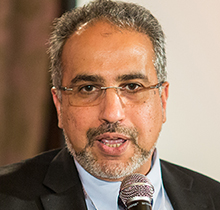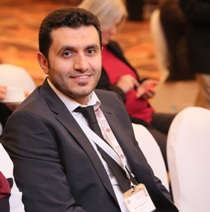In a nutshell
Military adventures and grand-vision megaprojects in the era of fading petrodollars are exactly like kicking in quicksand: they pull you down further.
Transforming MENA economies away from dependence on petrodollar receipts, like getting out of quicksand, will only be possible through calm, gradual and methodical reforms.
This requires investing in the right types of education and following regionally coordinated industrial policies that boost intra-regional trade and promote long-term competitiveness.
At a recent conference, after one of us questioned the wisdom of megaprojects and other unrealistic ‘Vision 2030’ plans in various Arab countries, the head of a major Gulf-country thinktank responded privately: ‘We can’t just give up’.
Unfortunately, many countries in the region continue to subscribe to the long-discredited idea that it is sufficient to boost investment in any form. Thus, they seek to catapult their economies through megaprojects that they hope will attract foreign investors, multiply their overall investment levels and produce much greater non-oil-and-gas economic growth.
This misguided hope ignores diminishing returns, crowding out of private investment and a host of other well understood economic principles (see Easterly, 2001). It may be tempting as political rhetoric, to convince regional populations that they do not have to get poorer in the medium term, but it does in fact make matters worse – like someone kicking frantically in quicksand. Military adventures and grand-vision megaprojects in the era of fading petrodollars are exactly like that: kicking in quicksand.
Fortunately, the quicksand analogy is not as dire as it may sound: according to National Geographic News, you cannot actually be pulled completely under to suffocate in quicksand (due to the lower relative density of human bodies). Nonetheless, it is true that sudden jerky movements, like military adventures and megaprojects, are likely to pull you further down into the quicksand.
The way to escape quicksand, a physicist quoted in the article tells us, is slow, methodical and gradual movement of the legs. Likewise, economies in the region are highly unlikely to collapse completely: they have accumulated sufficient financial savings from periods of high oil prices, and their natural resources will not lose all value for many decades to come.
But sudden massive investments in white-elephant megaprojects, and military adventures that boost the short-run oil-price risk premium, are likely to make matters worse in the long run.
Transforming their economies away from dependence on petrodollar receipts (which are primary economic drivers in major exporters and secondary drivers in their regional neighbours), like getting out of quicksand, will only be possible through calm, gradual and methodical reforms. This requires investing in the right types of education and following regionally coordinated industrial policies.
Unfortunately, history has shown that kicking frantically in the quicksand is the more likely scenario in the Middle East. Our extensive study of quarterly data for 70 countries between 1979 and 2017 shows that periods of low oil prices are regularly followed by periods of heightened geopolitical risk.
In turn, the latter lead to higher oil prices in the short term, which gives further incentives for countries to chase such short-term returns at the expense of methodical long-term investment in human and productive capital. Thus, every episode of the oil-price cycle since the 1970s has been extravagantly worse than earlier ones.
Now, as the golden age of oil nears its end, regional per capita incomes are destined to fall precipitously from their artificial petrodollar-boosted levels. It may be easier politically to market magic solutions based on quick and massive investment. But such projects are likely to make matters worse in the medium to long term by depleting scarce financial resources, crowding out productive private investment and delaying necessary reforms in attitudes toward vocational training and education appropriate for countries at the region’s very early stage of economic development.
Moreover, our research shows that global financial liquidity cycles are linked pro-cyclically to petrodollars. Thus, incoming foreign investments are more likely when they are least needed, in the form of second-round recycled petrodollars seeking quick returns. They are much less available when they are most needed during periods of low oil prices, because reversed petrodollar recycling causes deceleration or outright reduction in global financial liquidity.
The latter, in turn, exacerbates eventual financial crises, such as the sovereign debt crisis of the mid 1980s and the mortgage-debt crisis of 2006-08. This has a further adverse impact on global demand, deepening the financial difficulties of primary, secondary and tertiary petrodollar recipients.
It is important to note that this phenomenon extends beyond major oil exporters and their labour-exporting neighbours. Our analysis shows that even Turkey’s investment and GDP are affected significantly and persistently over the long term by a reduction in oil prices.
The long-term solution for the region has been well understood for many decades. It requires carefully orchestrated regional industrial policies to boost the nearly non-existent intra-regional trade and promote long-term competitiveness in world markets.
But this necessary long-term focus has been undermined repeatedly by the temptations of short-term opportunism, including beggar-thy-neighbour temporary benefits from geopolitical strife and its significant oil-price risk premium. Thus, intraregional competition and conflict, like sporadic kicks in quicksand, seem momentarily to pull some regional economies higher, but, in fact, help only to sink them further, making their eventual success more difficult and less likely.
The discussion of quicksand in National Geographic News suggests that you cannot drown in quicksand because the human body will float partially, just as regional economies can muddle through when oil prices are low. But the article also warns that if you stay trapped in quicksand long enough, the sea tide might rise and cause you to drown.
Having lost the opportunity to pursue gradual and methodical plans to escape the resource curse on several previous occasions, we need to recognise that we can only make up for lost time by moving slower, not faster. These difficult times call for methodical and realistic regional industrial planning, rather than misguided wars and glitzy megaprojects.
Further reading
Abdel-Latif, Hany, and Mahmoud El-Gamal (2017) ‘Financial Liquidity, Geopolitics, and Oil Prices’, mimeograph, Swansea University and Rice University.
Easterly, William (2001) The Elusive Quest for Growth, MIT Press.
El-Gamal, Mahmoud (2016a) ‘Discordant Egyptian and Saudi Visions 2030 and the Forgotten Quest for MENA Economic Integration’, Baker Institute for Public Policy Working Paper, September.
El-Gamal, Mahmoud (2016b) ‘Winter Is Coming: Controlled Conflicts and the Oil-Price Geopolitical Risk Premium’, Baker Institute for Public Policy Working Paper, November.



